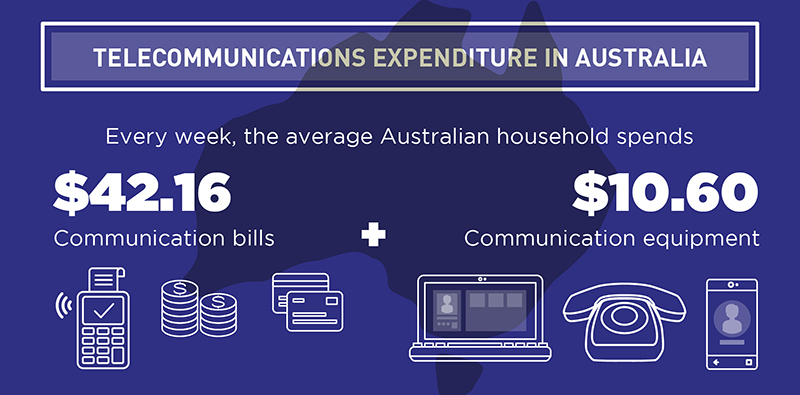In response to consumers experiencing long wait times and other significant customer service issues when contacting their telecommunications providers.
ACCAN commissioned Synergies Economics to develop a model to estimate the cost of consumer time that is spent trying to resolve issues with their telecommunications provider.
To extend this work, ACCAN has commissioned Colmar Brunton to collect data for use in the economic modelling prepared.
Read more: Still Waiting...Costing Wait Times for Telecommunications Consumers
A new report released by ACCAN today delves into young people’s experiences and issues with accessing and using phone and internet services.
We know that for many young people, phone and internet services are vital for work, study, accessing services and keeping connected with family and friends.
Our research focused on:
- The services used by young people, and their needs,
- How they navigate the market, make choices and deal with issues
- What is important to them when it comes to communications services.
Last year, the Australian Communications Consumer Action Network (ACCAN) commissioned research into the quality of live captions on Free-to-Air TV. We commissioned this research after receiving feedback from consumers and our members about the quality of live captions on TV.
Read more: Live Caption Monitoring on Australian Free-to-Air Television
ACCAN often hears stories from consumers spending hours waiting and trying to resolve problems with telcos (eg on the phone, in shops, or via chat windows). We know that all this time has a value to consumers but what is the cost?
A new report released from ACCAN provides advice on how to estimate the cost of consumer wait time.
 A new report released today by Australia’s peak communications consumer organisation, the Australian Communications Consumer Action Network (ACCAN), shows that telco customer service representatives are being encouraged to focus on selling over service, potentially exposing consumers to questionable selling practices.
A new report released today by Australia’s peak communications consumer organisation, the Australian Communications Consumer Action Network (ACCAN), shows that telco customer service representatives are being encouraged to focus on selling over service, potentially exposing consumers to questionable selling practices.
ACCAN has observed a lower proportion of fixed Internet service uptake in rented households, as well as reports relating to barriers about access to this type of service. These barriers are often due to the imbalance of power between renters and landlords.
This is a concern for ACCAN, who have raised questions around the proportion of rented households who have deliberately chosen mobile services for their home.
Read more: Issues faced by renters in Australia’s phone and internet market
 In 2017, Google and ACCAN once again partnered to offer a paid internship to a recent graduate who wished to explore an emerging communications consumer issue.
In 2017, Google and ACCAN once again partnered to offer a paid internship to a recent graduate who wished to explore an emerging communications consumer issue.
After submitting a brief proposal which outlined her desired research project, recent law and media graduate Jelena Ardalic was selected as the winner of the internship. Ardalic’s report, ‘Midas Touch: Consumer Implications of the Use of Smartphone Biometric Data’, discusses the impact that the use of biometrics (e.g. fingerprints, face recognition etc.) may have upon consumers’ privacy.
Read more: Midas Touch: Consumer Implications of the Use of Smartphone Biometric Data
Results from ACCAN’s Customer Service Survey
The survey was conducted with 1,347 telecommunications consumers who had contacted their provider about a question or problem in the previous 12 months. Respondents were customers of 10 different providers- eight are those with the biggest market share plus the two providers with the largest number of satellite customers (to ensure the survey was not solely urban focused). Respondent targets (see Figure 1 of the report) for each provider were set according to estimated market share, calculated using the most recent annual reports of the providers and cross checked against the Australian Communications and Media Authority Communications Report 2016. The following table shows sample sizes achieved and weightings attributed.
Read more: CAN YOU HEAR ME? Ranking the customer service of Australia’s phone and internet companies
 ACCAN worked with Dr Greg Ogle of the South Australian Council of Social Services to analyse the detailed telecommunications data from the Australian Bureau of Statistics’ 2015-16 Household Expenditure Survey. This analysis provides a more detailed view of the telecommunications expenditure of different groups in Australia.
ACCAN worked with Dr Greg Ogle of the South Australian Council of Social Services to analyse the detailed telecommunications data from the Australian Bureau of Statistics’ 2015-16 Household Expenditure Survey. This analysis provides a more detailed view of the telecommunications expenditure of different groups in Australia.
Some key findings are that:
 An interdisciplinary team of researchers at the University of Melbourne have updated their research on the fate of online accounts, financial assets and personal profiles when a user passes away. The team investigated licencing policies, terms of use agreements and copyright law, and interviewed a range of people, including funeral directors, religious workers, internet content and service providers, as well as estate planning lawyers.
An interdisciplinary team of researchers at the University of Melbourne have updated their research on the fate of online accounts, financial assets and personal profiles when a user passes away. The team investigated licencing policies, terms of use agreements and copyright law, and interviewed a range of people, including funeral directors, religious workers, internet content and service providers, as well as estate planning lawyers.
The updated version includes new features and services such as 'legacy contact' options, legislation changes and online bereavement practices.
Google and ACCAN partnered again in 2017 to offer a paid internship opportunity. Applicants were invited to submit a brief proposal outlining a research project on an emerging communications consumer issue.
The winner was law and communications student, Jesse Chen, who wrote an in-depth research report titled: 'Breaking Down Barriers to Digital Government: How can we enable vulnerable consumers to have equal participation in digital government?
In 2016 ACCAN commissioned a follow-up to our 2014 Disability Mystery Shopping survey. Disappointingly, the results indicate that little has changed for consumers with disability in the intervening years. Telco sales staff have very little knowledge of products or services suitable for consumers with disability.
Despite industry initiatives to improve the availability of appropriate information after the 2014 survey consumers with disability continue to struggle to find relevant and useful information about mainstream telecommunications products.
